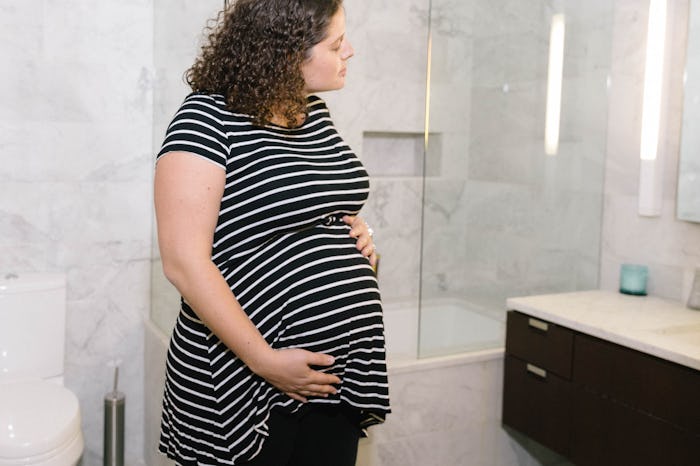Life
If Your Fundal Height Is Measuring Large, Here's What Could Be Causing It
Like most people, pregnant women come in all shapes and sizes, but that doesn't stop people from questioning your body. For all the comments about how you’re showing, the most annoying one of all is, “Are you sure you’re not carrying twins?” when you know for a fact you aren’t. It probably doesn't help if your fundal height is measuring large, but when you know there's just one baby in there, what's actually happening?
To measure your belly, your OB-GYN or midwife will perform a fundal height measurement each visit starting at about 12 weeks. This measures your baby’s growth and is the "distance from the pubic bone to the top of the uterus measured in centimeters. After 20 weeks of pregnancy, fundal height often matches the number of weeks you've been pregnant," according to Mayo Clinic. But what does it mean if your measurements are higher than the number of weeks you're pregnant?
Patricia A. Evans, a nurse practitioner and certified nurse midwife at MemorialCare Orange Coast Medical Center in Fountain Valley, California, tells Romper that most reasons are perfectly normal, including, “any fetal position other than cephalic (head down), incorrect dating, polyhydramnios (high amniotic fluid levels), or fibroids. Or perhaps multiple gestation (twins, triplets, etc.).”
You could also have weaker abdominal muscles from additional pregnancies, increasing your fundal height's size, Evans says. What to Expect also noted that most women tend to have bigger pregnant bellies in their second or third pregnancies because your abdominal muscles are looser from being stretched in your previous pregnancy, and you can definitely show sooner. Your belly has previously been stretched before, so it doesn’t take much for it to happen again. “Your body type might also be at play; some women carry their babies lower, which makes them appear to stick out more,” the website also noted. So if this isn't your first baby, don't be alarmed if your health care provider notices your belly's measuring a little larger than it should.
And if your belly is measuring too large based on the fundal height measurement, your OB-GYN will order an ultrasound to estimate the baby’s weight, Evans says. “But the majority of the time, your baby just may be on the bigger side but still healthy and normal.” And remember, nothing in pregnancy is ever certain — there's definitely room for error in situations like this, and measuring large one day may not mean that in two or three weeks you'll still be measuring as far ahead.
Just because you look like you’re four months pregnant in the first trimester — and continue to measure big throughout your pregnancy — doesn’t mean you’re fat, not eating healthy enough, or not getting enough exercise. (Or that you’re carrying twins, random stranger.) If you’ve been pregnant before, your muscles are usually just stretched out from your previous pregnancy, or you could just be carrying low, have a lot of amniotic fluid, or your baby isn’t head down. If there's any actual concern, your OB-GYN will let you know.
Experts:
Patricia A. Evans, nurse practitioner and certified nurse midwife at MemorialCare Orange Coast Medical Center
